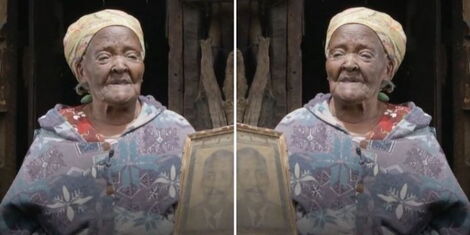Kenyan Granny Goes International With Cash Demand to Queen Elizabeth
Published on June 2, 2022 at 2:08 PM by Chisomo Kambale
A Kenyan granny, Muthoni Mathenge, has gone viral after demanding that Queen Elizabeth II compensates her in cash for the torture she and her husband underwent in the fight for Kenya’s independence.
Speaking to the German media station, Deutsche Welle (DW), Mathenge asked the monarch to compensate her for the torture she went through at the hands of British troops under the colonial government.
In the wake of the Queen’s Platinum Jubilee, the ex-freedom fighter stated that she wanted the remuneration to be made to her directly and not through lawyers as she could not afford one.

“Let Elizabeth bring what belongs to me, no middlemen in between. Let the compensation come directly to me. Let her give me a just compensation because she is the ruler,” urged Muthoni.
The octogenarian recounted how she was allegedly tortured by British troops in 1952 after they had stormed her house in search of her husband, who was part of the Mau Mau rebel group.
“When they came looking for him, I told them that I had not seen him for days. I refused to tell them because snitching your own whereabouts of fighters would amount to death,” she recounted.
Muthoni displayed marks on her right foot as proof of torture, explaining that she reunited with her husband in the forest with the help of her neighbors. That was, however, the last time she saw him.
“He nursed my wounds, even the ones on my legs. If you take a look at this leg, you can see it had been cut using an ax twice,” she explained while displaying the marks.
The octogenarian becomes the latest addition to Kenyans seeking compensation from the British government over injustices during the colonial rule.
On May 4, lawyer Joel Kimutai Bosek wrote to Prince William asking for compensation for land grabbed from Kenyans.
Bosek asked the Duke of Cambridge to facilitate the compensation of the victims, whom he claimed were violently evicted from their homes to pave way for the establishment of tea plantations by the white settlers.
“Our people were violently evicted from their homes to make space for the very lucrative tea plantations that still exist today. Many men and women were raped, arbitrarily detained, and in some cases killed whilst trying to resist the evictions.
“We are turning to you now, 70 years later, as a group of over 100,000 victims from Kericho whose suffering as a result of this period has been entirely ignored by your family and successive British governments,” Bosek’s letter read in part.



